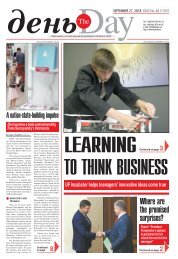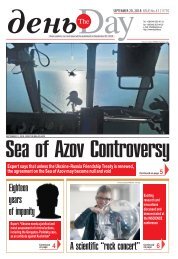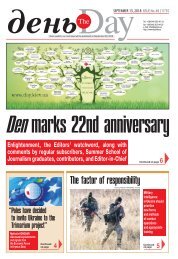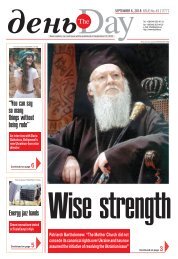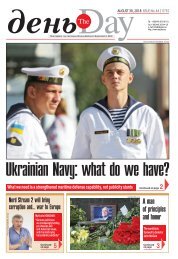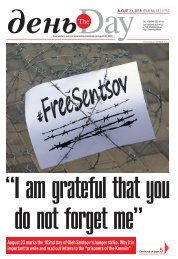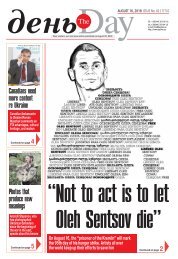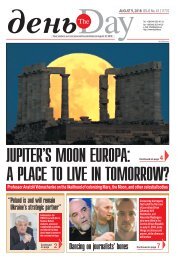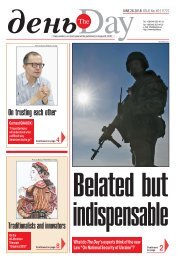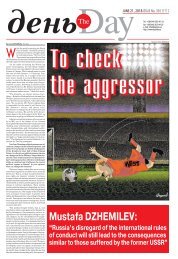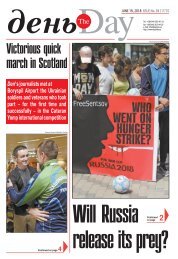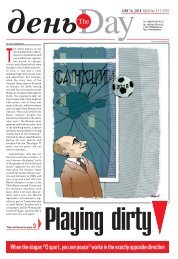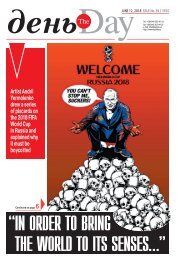#40_1-8
Create successful ePaper yourself
Turn your PDF publications into a flip-book with our unique Google optimized e-Paper software.
6<br />
No.40 JUNE 26, 2018<br />
CLOSE UP<br />
WWW.DAY.KIEV.UA<br />
Welcome<br />
to Halych!<br />
The new issue of Route No. 1<br />
calls on you to visit a historic<br />
Ukrainian town<br />
By Daria TRAPEZNIKOVA, The Day<br />
“There are a lot of cities,<br />
such as Polish Krakow and our<br />
Kharkiv, which used to be capitals<br />
and still remain major industrial<br />
or cultural centers that<br />
continue to develop. But Halych<br />
was forgotten and did not develop<br />
for years to come. Moreover,<br />
we were forced to forget<br />
our history and achievements<br />
of our ancestors,” Halych Mayor<br />
Orest TRACHYK says. Route<br />
No. 1’s creative team is changing<br />
this tendency by dedicating the<br />
next issue of the glossy to the<br />
raion center in Ivano-Frankivsk<br />
oblast, which once was a princely<br />
capital and gave the name to<br />
a whole region.<br />
Halych, situated on the way<br />
from Lviv to Ivano-Frankivsk,<br />
can become a tourist attraction<br />
on this itinerary. In spite of a<br />
small size, the town still can surprise<br />
travelers with a harmonic<br />
combination of ancient architectural<br />
monuments and nature<br />
spots of indescribable beauty.<br />
Memories of the past are closely<br />
guarded, and customs and artistic<br />
achievements are being revived<br />
here. From time immemorial,<br />
different peoples and religions<br />
have peacefully coexisted<br />
on these territories. This left an<br />
imprint not only on museum expositions,<br />
but also on traditions,<br />
everyday life, and cuisine. Therefore,<br />
“tasty” discoveries are<br />
awaiting readers not only on culinary<br />
pages.<br />
There are also many interesting<br />
things in the villages of<br />
Halych raion and on the banks of<br />
one of Ukraine’s largest rivers,<br />
which flows to the sea through<br />
the town. Why do Galicia residents<br />
and tourists love the Dniester<br />
and its tributaries so much,<br />
which of the Galician “places of<br />
strength” is the strongest, what<br />
benefits will, in the view of the<br />
Halych mayor, the district’s inhabitants<br />
derive from the unification<br />
of the neighboring villages<br />
into one commune? The<br />
fresh issue of Route No. 1 is all<br />
about this. You can find it at<br />
newsstands or make an order on<br />
Den’s website or by the sales section’s<br />
phone (044) 303 96 23.<br />
By Svitlana AHREST-KOROTKOVA<br />
The Folio publishing house<br />
introduced to the Ukrainian<br />
reader for the first time one of<br />
the most famous and globally<br />
published Israeli writers, Meir<br />
Shalev, whose novel My Russian<br />
Grandmother and Her American<br />
Vacuum Cleaner has appeared in the<br />
series “Map of the World,” translated<br />
by Volodymyr Verkhovnia.<br />
The writer’s great sense of style,<br />
unusual imagery, humor and selfirony,<br />
impeccable plot designs and<br />
high intelligence won my heart long<br />
ago. And I know I am not alone.<br />
Shalev was a guest of the Book Arsenal<br />
festival, and I am grateful to<br />
the Embassy of Israel in Ukraine for the<br />
opportunity to communicate with him.<br />
● THE FIRST UKRAINIAN<br />
IMPRESSIONS<br />
My dear Mr. Shalev, let me greet<br />
you in Ukraine. Your books are widely<br />
known in the world, and have been<br />
released in Russian translations many<br />
times. Now is the first time that a book<br />
of yours reached the Ukrainian reader.<br />
What is your opinion of this translation,<br />
and how did you find working<br />
with the Ukrainian book market?<br />
“I cannot, unfortunately, evaluate<br />
the quality of the Ukrainian translation.<br />
Apart from Hebrew, I know only English,<br />
and do not speak other foreign languages.<br />
Given that the publisher was interested<br />
and published my book, I trust<br />
that he made every effort to ensure that<br />
the translation was a high-quality one.<br />
As for the Ukrainian book market, I<br />
flew to Ukraine for the first time to visit<br />
the Book Arsenal, and I really liked<br />
the location. It is a very beautiful building.<br />
I was to book fairs and festivals all<br />
over the world, but nowhere had seen so<br />
comfortably organized space, or such a<br />
beautiful children’s section, because I<br />
also write children’s books. I was impressed<br />
by the Book Arsenal’s children’s<br />
playgrounds, interactive books<br />
and exhibitions. This is one of the most<br />
beautiful and best-organized festivals.”<br />
● LITERATURE AND FAMILY<br />
AFFAIRS<br />
I read your novel The Blue Mountain<br />
for the first time, and my feelings<br />
from it and its structure, its construction<br />
of images and thoughts have brought to<br />
my mind a comparison with my favorite<br />
writer Gabriel Garcia Marquez.<br />
“I am pleased.”<br />
A writer usually, like any creative<br />
individual, starts with themselves, describing<br />
the events of their life, what<br />
happened to them. What I know about<br />
you contradicts this norm. You are not<br />
engaged in agriculture, are absolutely<br />
secular, do not really observe all the rituals.<br />
Where do these contradictions<br />
“Our family still makes borscht...”<br />
Works of Meir Shalev, one of the most<br />
famous Israeli writers, have been translated<br />
into 16 languages. Recently, one of them<br />
appeared in Ukrainian for the first time<br />
come from: the image of the Land of Israel<br />
itself or from your worldview?<br />
“I just invent some stories, they are<br />
fruits of my imagination. I also use for<br />
my narrative some family stories. Yes,<br />
I am not a farmer, but my entire maternal<br />
family were farmers and have<br />
stayed in business. I came down to their<br />
farm during every school vacation when<br />
I was a child. I am well aware of what<br />
farming was like 50 years ago. My<br />
greatest inspiration is the narration<br />
talent in our family, which was passed<br />
on in my mother’s line. All my paternal<br />
family members were intellectuals, urbanites,<br />
critics, scholars of literature,<br />
writers, and researchers. Meanwhile, my<br />
mother’s family, when they gathered at<br />
the farm, especially women, they preserved<br />
fruits, salted cucumbers, and told<br />
some stories all the time, while I sat and<br />
listened. When I began to write, fragments<br />
of these stories surfaced in my<br />
mind, as they had gotten deeply rooted<br />
in memory, and they were of use to me.”<br />
Being the son of a famous person<br />
and working in the same line is very<br />
difficult, because your father was a famous<br />
Israeli writer. Did it help or<br />
hamper you? How did you manage to<br />
avoid unconscious pressure?<br />
“Father did not hamper me, rather,<br />
he helped, because he told me: ‘write,<br />
write,’ whereas at that time, I was not<br />
even going to start writing. I read a lot<br />
and loved books. Father suggested that<br />
I try my hand. However, I was fascinated<br />
by something completely different,<br />
and when I finally wished to write, I first<br />
published two children’s books at 35, and<br />
my first ‘adult’ publication appeared<br />
when I was 40. It was too late to either<br />
benefit from the glory of my father or<br />
worry about it somehow. My father<br />
published only one novel, but it was a<br />
very successful one. I think that I have<br />
my own style, so the influence of my father<br />
as a writer on me and my style is virtually<br />
negligible.”<br />
● FROM WORD COOKERY TO<br />
EVERYDAY GIMMICKS<br />
An integral part of your style is describing<br />
food, which in Israel is a kind<br />
of “religion,” or as I put it, a “national<br />
entertainment.” I remember the<br />
description of the process of eating<br />
olives by the grandfather in The Blue<br />
Mountain, I also remember the simple<br />
meal which the grandmother instantly<br />
cooked in A Pigeon and a Boy. This<br />
magic of food is present in every work<br />
of yours. And what does this cooking<br />
atmosphere mean for you?<br />
“What is happening in Israel with<br />
food and around food is exaggerated<br />
and somewhat even vulgar. We have<br />
endless cooking shows, restaurant<br />
cuisine, high cuisine, dishes from the<br />
chef. I love the food that is cooked at<br />
home. There are several ‘secret’<br />
Photo by Ruslan KANIUKA, The Day<br />
recipes that came to me from my mom<br />
and aunt. I was married to a woman<br />
from the Sephardic community, her<br />
family had come from Bulgaria. The<br />
Bulgarian cuisine is also extremely interesting,<br />
being half Turkish and half<br />
Greek. Homemade food has a soul. I<br />
describe it in my novels. Frankly<br />
speaking, my grandmothers did not<br />
cook very well. It was even outright<br />
bad in the paternal line. Meanwhile,<br />
my favorite Grandma Tonya cooked<br />
well, but there was nothing special<br />
about it. With each new generation,<br />
we perfect the culinary arts. My son<br />
cooks better than me and my wife, my<br />
brother cooks better than mom. There<br />
is still potential for development, so<br />
the next generation will surprise us<br />
with their culinary skills.”<br />
● LITERATURE AND<br />
JOURNALISM<br />
You devoted yourself to literary<br />
work and at the same time became a<br />
prominent columnist for a famous<br />
publication. Where, in your opinion, is<br />
the watershed between journalism and<br />
literature?<br />
“The watershed runs exclusively<br />
between midnight on Wednesday and<br />
morning on Thursday. I am not a journalist,<br />
I do not run about, I do not look<br />
for news, I work at home as a columnist,<br />
and when the editor calls me: ‘Go there,<br />
look at it, and tell about your impressions,’<br />
I say ‘No.’ True journalism has<br />
nothing to do with reality. I sit down to<br />
write a column on Thursday morning,<br />
I submit it the same evening, and it appears<br />
in the newspaper on Friday morning.<br />
After that, I forget about journalism<br />
and devote myself to literature<br />
until next Thursday.”<br />
Do you feel that all the literary<br />
genres that exist today, with all their<br />
diversity, are laid down in the Ancient<br />
Book?<br />
“All world literature began with the<br />
Bible and Greek mythology, as the story<br />
of the voyage of Odysseus is very<br />
widely used in modern literature. But<br />
speaking of the Old Testament, I love<br />
it, because it does not delve into psychology.<br />
It is just stories, a great text.<br />
For example, look at the story of Jacob<br />
and Rachel. He first saw Rachel and<br />
wept. Were a modern author to write<br />
about this, they would have typed a<br />
whole chapter about what happened,<br />
what he thought, how and who perceived<br />
it. And here, it is just one sentence:<br />
‘Jacob saw her and wept.’ And<br />
the reader should think: why? Millions<br />
of beautiful women were around<br />
for centuries throughout history, but<br />
no one walked and wept in the streets<br />
because of them. That is, this is a little<br />
discovery that the reader has to make<br />
on their own. The Bible does not delve<br />
into psychology as it tells its story.”<br />
● A BIT OF ACTION FOR A<br />
SEDENTARY WORKER<br />
Are you still a brave biker who<br />
takes part in various competitions?<br />
“I have never been a biker, I like to<br />
drive a motorcycle and can do it, but I<br />
have never competed. I did participate<br />
in an SUV rally, though. I am a<br />
very good driver and still go to the<br />
desert with my friends, staying there<br />
for the night. It was while driving an<br />
SUV that I participated in competitions.<br />
But it took a lot of time, technical<br />
training was needed. I decided that<br />
I could be either a driver or a writer. I<br />
had to leave the races. I did not do this<br />
to get some experience, it is my hobby.”<br />
● ATTEMPTING TO DRAW<br />
PARALLELS<br />
For me, the rise of Israel and how<br />
it lives today is a very colorful and<br />
vivid example of how individual people<br />
can build their own country, provided<br />
they are actively optimistic.<br />
Does the hybrid war in Ukraine bring<br />
to mind some sort of comparison with<br />
your country somehow?<br />
“Optimism is indeed our immense<br />
feature. After so many years of scattering,<br />
pogroms, and expulsions, we<br />
have remained alive. This is already a<br />
sufficient reason for optimism. I am<br />
not familiar enough with the political<br />
situation in Ukraine to analyze it, but<br />
I can give one piece of advice, based on<br />
the Israeli experience: you are very<br />
fortunate that there is no religious<br />
component in your conflict. But judging<br />
by what I have seen – even if this<br />
is limited to the space of the Book Arsenal<br />
– your country is quite self-sufficient<br />
and self-identified.”<br />
Do you see a common future,<br />
some more cooperation? Will you<br />
come to the nearest book fairs in<br />
Ukraine?<br />
“If they translate more of my<br />
works, I will be glad. But I would prefer<br />
that the next translation be The<br />
Four Meals, because it is a romantic,<br />
gentle, meaningful book. And immediately<br />
after it, I would like to see Two<br />
She-Bears translated, just for the sake<br />
of contrast, because it is tough,<br />
rough, and completely different. I will<br />
be pleased to come and launch each<br />
new translated book. There are only<br />
two conditions – I will come in the<br />
summer, because the winter is very<br />
cold. And secondly, I want to be treated<br />
to a borscht meal. (Laughs.) Our<br />
family still makes borscht.”



